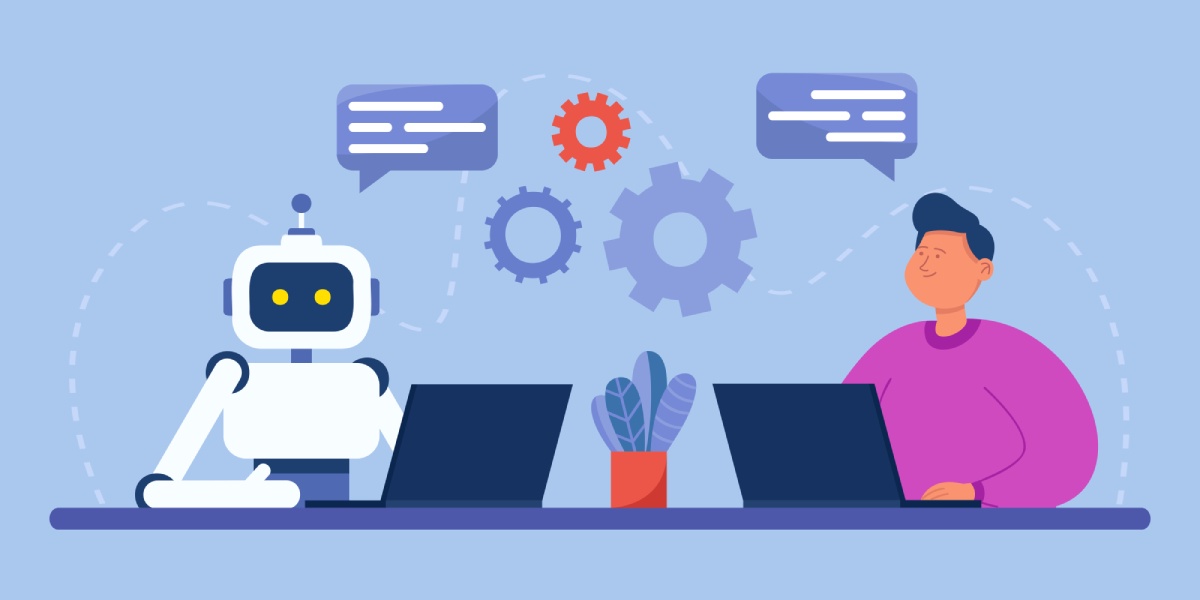Introduction
Embarking on a journey through the intricate landscape of technology, the dynamic fusion of AI & Machine Learning (ML) is shaping a transformative narrative across industries. Among the sectors undergoing an unmistakable metamorphosis, software development, with its reliance on AI and machine learning services, emerges as a prime example of how these technologies are redefining conventional practices. This blog takes a comprehensive dive into the myriad ways AI and ML, specifically in software development services, are reshaping the software development landscape.
The Foundation
At the very core of this transformative narrative is the foundational role of AI in reshaping traditional paradigms of software development. What was once a futuristic vision is now a tangible reality, influencing how applications are conceptualized, developed, and brought to fruition.
Impact of AI & Machine Learning in Software Development
1. Intelligent Coding Assistance: Enhancing Developer Productivity with AI
- AI-powered Coding Assistants Revolutionize Interaction: Developers witness a paradigm shift in their coding experience as AI-powered assistants, driven by ML algorithms, provide real-time suggestions, best practices, and code examples. This transformative capability not only expedites coding but significantly enhances overall efficiency.
- Accelerated Coding Processes for Increased Productivity: AI contributes to a paradigm shift in productivity by accelerating coding processes. Developers can now focus more on the creative aspects of coding, steering away from routine and repetitive tasks, and fostering a dynamic synergy between human ingenuity and machine efficiency.
- Exemplary Tools Showcasing AI Impact: Tools such as Kite and Codota exemplify AI’s tangible influence in coding across multiple languages, including Python, Java, and beyond. Integrated into workflows, these tools showcase the transformative power of AI, making coding more intuitive, efficient, and enjoyable.
2. Smart Prototyping Advancements: Accelerating Innovation with AI
- Rapid Translation of Business Functionalities: In software development, smart prototyping takes a leap forward through AI-driven tools. Solution architects leverage these tools to rapidly translate complex business functionalities into tangible technical prototypes, crucial in industries where time-to-market is decisive.
- Efficient Addressing of Time-consuming Prototyping: AI effectively addresses the traditional hurdles of time-consuming prototyping processes. The swift translation of business requirements into technical prototypes allows developers to showcase minimum viable products in record time, enabling swift iterations based on immediate feedback.
- Achieving User Interface Excellence: AI contributes to achieving user interface excellence from project inception. Fully functional UI components are seamlessly created, enhancing the user experience and providing a valuable reference point for further development phases.
3. AI-Driven Error Management: Ensuring Code Quality with Proactive Measures
- Proactive Error Identification as a Game-changer: AI’s role in error management goes beyond identification to proactive rectification, ensuring the production of high-quality, error-free code. Intelligent bots analyse and categorize errors, providing invaluable insights into potential issues, allowing early-stage interventions.
- Autonomous Systems Enhancing Quality Assurance: AI-enabled systems autonomously identify, trace, and rectify errors, contributing to the quality assurance process. Automation of error rectification allows developers to focus on more strategic aspects of coding, confident that routine errors are handled efficiently.
- Mitigating Risks in Development Lifecycle: Integration of AI mitigates the risk of errors slipping through the cracks during the development lifecycle. This ensures a smoother and more reliable software delivery process with a reduced likelihood of undetected errors.
4. AI and ML in Software Testing: Redefining Quality Assurance Strategies
- Comprehensive Quality Assurance Beyond Automation: AI-driven platforms redefine quality assurance by transcending traditional automation tools. These platforms conduct in-depth analyses of code for errors, ensuring a more thorough examination of software functionality.
- Enhanced Automated Sanity Checks: Automated sanity checks, a vital component of the testing phase, are significantly enhanced by AI. These checks ensure the overall quality of the software, minimizing the likelihood of bugs in the final product.
- Efficiency Optimization Through Human Resource Liberation: AI’s efficiency optimization in testing allows human resources to focus on more strategic aspects of software development. This enhances overall efficiency and innovation in the testing process.
5. Predictive Scheduling and Budgeting: Elevating Project Management with AI & ML
- Data-Driven Project Management for Accurate Estimates: ML algorithms contribute to accurate project estimates in data-driven project management. Considering project scope, client deliverables, and historical performance metrics, AI aids project managers in making informed decisions about timelines and resource allocation.
- Client-Centric Approach with Transparent Timelines: Predictive scheduling and budgeting, facilitated by AI, enhance the client-centric approach. Providing realistic timelines and financial expectations ensures clients have a clear understanding of the project’s progress and potential challenges, fostering transparency and trust.
- Transformative Shift in Project Management: The incorporation of AI in project management marks a transformative shift. Leveraging predictive capabilities, project managers navigate complexities with confidence, ensuring successful outcomes and satisfied clients.
Learn more – https://www.varseno.com/software-development-services/
Conclusion
The symbiotic relationship between AI and machine Learning represents not just a technological advancement but a paradigm shift in the conception and creation of software. From the birth of code to the final deployment, these technologies infuse intelligence, efficiency, and innovation into every phase of the software development lifecycle. As businesses globally embark on digital transformation journeys, embracing the potential of AI and ML in software development services is not just an option; it’s a necessity to stay competitive, adaptive, and at the forefront of innovation in the ever-evolving landscape of technology. The journey toward a smarter, more efficient, and innovation-driven software development future is powered by the transformative capabilities of AI and Machine Learning.


No comments yet